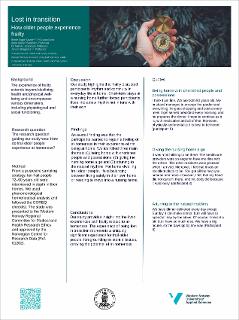Lost in transition? How frail older people experience at-homeness
Others
Accepted version

Åpne
Permanent lenke
https://hdl.handle.net/11250/2990239Utgivelsesdato
2021Metadata
Vis full innførselSamlinger
- Import fra CRIStin [3628]
- Institutt for helse- og omsorgsvitskap [2858]
Originalversjon
Søvde, B. E., Sandvoll, A. M., Natvik, E, & Drageset, J. (2021). Lost in transition? How frail older people experience at-homeness [Poster]. Høgskulen på VestlandetSammendrag
Background The experience of frailtyextends beyond declininghealth and physical wellbeing and encompassesvarious dimensions,including physiological andsocial functioning.Research questionThe research questionguiding our study was: Howdo frail older peopleexperience at-homeness?MethodFrom a purposive samplingstrategy, ten frail people72–90 years old wereinterviewed in depth in theirhomes. We usedphenomenologicalhermeneutical analysis andfollowed the COREQchecklist. The study waspresented to the WesternNorway RegionalCommittee for Medical andHealth Research Ethicsand approved by theNorwegian Centre forResearch Data (Ref.61202). DiscussionOur study highlights that frailty disruptedparticipants’ rhythm and continuity ineveryday life at home. Short-term stays ata nursing home further forced participants’lives into a new rhythm not in tune withtheir own. FindingsAn overall finding was that theparticipants wanted to regain a feeling ofat-homeness in their experience of notbeing at home. We identified three mainthemes: (1) being home with cherishedpeople and possessions, (2) giving thenursing home a go and (3) attuning tothe natural rhythms. For home-dwellingfrail older people, life is balancingbetween living safely in their own homeor needing to move into a nursing home. ConclusionsOur study provides insight into the livedexperiences with frailty related to athomeness. The experience of being lostin transition represents a uniquelysignificant experience for frail olderpeople, foregrounding existential issues,carrying the potential of at-homeness.